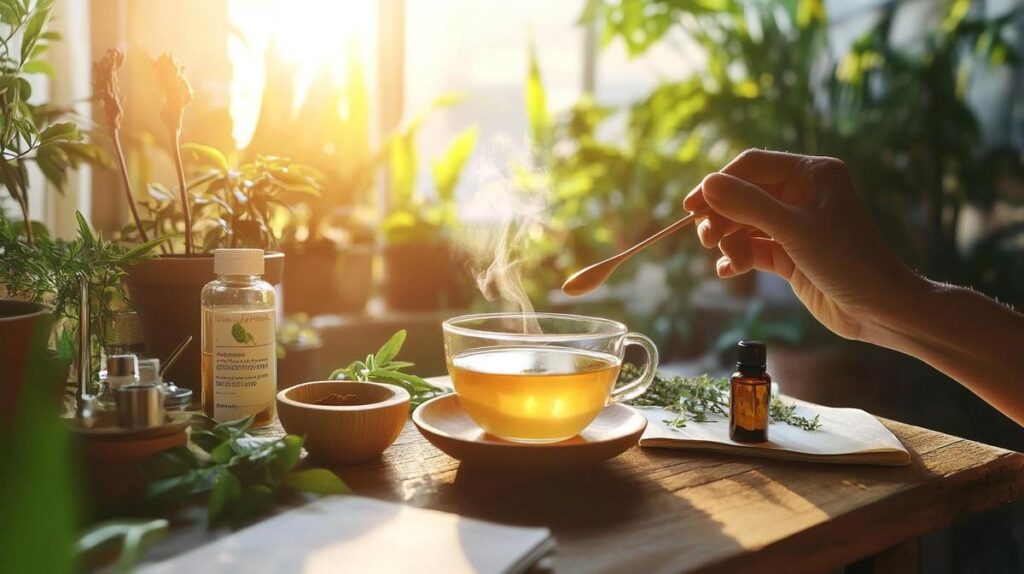TL;DR:
- Hormonal balance affects growth, mood, metabolism, and issues like fatigue, weight gain, and PCOS.
- Key herbs:
- Ashwagandha supports cortisol and adrenal health.
- Chasteberry helps with PMS, menopause, and hormonal cycles.
- Milk thistle supports liver function for estrogen balance.
- Maca root and shatavari aid estrogen/progesterone regulation.
- Spearmint tea reduces androgens linked to PCOS and acne.
- Black cohosh and clary sage reduce menopause symptoms.
- Adaptogens (e.g., rhodiola, holy basil) improve stress regulation via cortisol.
- Moderate use of teas (1–3 cups/day) or herbs is recommended.
- Herbs help alongside lifestyle changes: healthy diets, exercise, sleep, and stress management.
- Always consult a healthcare provider for safety and compatibility.
Are herbs the secret to achieving hormonal balance, or is it just clever hype? If you’ve ever felt stuck with stubborn PMS symptoms, mood swings, or low energy, you’re not alone—and you’re likely searching for something natural that works. As someone who’s studied the real impact of herbs on hormone health, I’m here to break it down. In this post, we’ll explore which herbs truly support hormonal balance and if they’re worth trying. Let’s dive in!
What Are the Best Herbs to Support Hormonal Health?
Hormonal health is key to how your body feels and functions daily. Hormones control growth, metabolism, mood, and much more. When they’re off balance, symptoms like fatigue, weight gain, or even infertility can appear. Natural shifts, like those during puberty or menopause, and health conditions like PCOS, can make hormones even harder to manage.
Herbs can offer a natural way to support hormonal balance. Unlike synthetic options, many herbs work with your body’s systems, especially the endocrine system. For example, adaptogens such as ashwagandha can help regulate stress hormones like cortisol. Chasteberry, on the other hand, targets reproductive hormones, possibly easing PMS or premenopause symptoms. Each herb brings unique benefits.
Before choosing an herb, safety is vital. Herbs like black cohosh are popular for symptoms like hot flashes but may cause reactions in some people. Others, like marjoram, show early promise for PCOS management but need further research. Always consider factors like your current health, age, and any medications you take. This ensures the herb won’t worsen imbalances or cause side effects.
If you’re curious where to start, websites like MedlinePlus offer good research. And remember, pairing herbs with healthy habits—diet, sleep, and exercise—boosts results. Hormonal balance is rarely a quick fix, but natural steps can make a big difference over time.
How Do Adaptogenic Herbs Help Regulate Hormones?
 Adaptogenic herbs stand out for their ability to help the body handle stress. Stress deeply impacts hormone levels, especially cortisol, which is known as the “stress hormone.” When you experience ongoing stress, your adrenal glands overwork, leading to imbalances in hormones like cortisol, adrenaline, and even sex hormones. This is where adaptogens come in.
Adaptogenic herbs stand out for their ability to help the body handle stress. Stress deeply impacts hormone levels, especially cortisol, which is known as the “stress hormone.” When you experience ongoing stress, your adrenal glands overwork, leading to imbalances in hormones like cortisol, adrenaline, and even sex hormones. This is where adaptogens come in.
Adaptogens are plant-based compounds that help your body adapt to stress. They work by regulating the hypothalamic-pituitary-adrenal (HPA) axis, which controls how your body responds to stress. Ashwagandha, for example, is one of the most well-known adaptogenic herbs for hormonal support. Research shows that it can lower cortisol levels, improve sleep, and support adrenal health. When cortisol is balanced, other hormones may find their balance more easily too.
Another powerhouse is rhodiola rosea, a herb used to improve energy and reduce fatigue. Studies suggest it helps manage stress-induced hormone imbalances by reducing cortisol spikes and calming your nervous system. Holy basil, or tulsi, also has a long history of use for managing physical and emotional stress, promoting hormonal stability over time.
By focusing on stress reduction and adrenal health, adaptogens could stabilize hormones indirectly. To learn more about how stress and hormones connect, visit the National Institute of Diabetes and Digestive and Kidney Diseases.
Can Hormone-Balancing Teas Improve Your Well-Being?
Hormone-balancing herbal teas like spearmint and raspberry leaf are popular for support. Spearmint tea may reduce excess testosterone, making it helpful for hormonal acne and PCOS. Raspberry leaf tea is rich in vitamins and minerals, often used to support menstrual and reproductive health. Both teas have long histories of traditional use, but scientific evidence backing them remains limited to smaller studies. They seem promising when included in a balanced routine.
Brewing these teas correctly maximizes their benefits. To prepare, steep one teaspoon of dried leaves in hot water for 5–10 minutes. Avoid boiling the water directly with the herbs, as this can diminish their active compounds. Using fresh, high-quality ingredients ensures you’re getting the best possible nutrients. Glass or stainless steel teapots can preserve heat and flavor during steeping, offering a better brew compared to plastic materials.
Moderation is key when adding herbal teas to your daily routine. Most people find 1–3 cups per day safe and effective, but this depends on individual health conditions. Pregnant or breastfeeding individuals should exercise extra caution and consult a healthcare provider first. Overusing herbal teas can sometimes cause unwanted side effects, such as digestive discomfort.
For those interested in blends that balance female hormones, combining other herbs like marjoram or nettle with raspberry leaf or spearmint could enhance the effects. This layered approach provides additional nutrients and hormone-regulating compounds, creating a well-rounded wellness strategy.
What Are the Top Herbs for Female Hormone Balance?
When it comes to hormone imbalances, women face unique challenges. PMS, menopause, and fertility changes can disrupt daily life. Certain herbs, like red clover, shatavari, and wild yam, are considered helpful for these issues because they address hormone shifts naturally.
Red clover contains plant compounds called isoflavones. These act like weak estrogens in the body, which can help with menopause. Studies suggest red clover may ease hot flashes and bone loss. For postpartum hormone changes, red raspberry leaf is another option. It has been used traditionally to support recovery and regulate hormones after childbirth.
Shatavari, an adaptogenic herb used in Ayurvedic medicine, is known for nourishing the reproductive system. It is often suggested for balancing estrogen and supporting fertility. Shatavari contains steroidal saponins—natural compounds that may help regulate hormones.
Wild yam contains diosgenin, a compound believed to influence progesterone levels. Many creams and supplements use wild yam to ease PMS or menopause symptoms. However, there is controversy about how well the body uses diosgenin directly.
While these herbs show promise, not all are safe for everyone. If you’re pregnant, breastfeeding, or taking medication, consult a healthcare provider first. Some herbs may interfere with hormones or health conditions. You can explore more about hormonal herbs here.
How Can You Naturally Balance Estrogen and Progesterone?
Balancing estrogen and progesterone is key for overall health. When these hormones are off, symptoms like mood swings, irregular periods, fatigue, and even infertility may show up. During certain life stages, like menopause or after childbirth, hormone changes are normal but can still feel overwhelming. Too much estrogen, sometimes called estrogen dominance, is common and may lead to headaches, weight gain, and menstrual troubles.
Herbs have shown promise in supporting these hormones naturally. Chasteberry is one of the most researched herbs for balancing estrogen and progesterone. It works by influencing the pituitary gland to help regulate hormonal cycles, especially in cases of PMS or menopause. Maca root is another option; it doesn’t contain hormones but appears to support the body’s system for hormonal balance through its adaptogenic effects. Milk thistle, known for liver health, helps the body process and eliminate excess estrogen.
Tracking symptoms is the best way to monitor progress with herbs. Simple tools like journals or health apps can help you notice changes over weeks or months. Before trying any herb, consult a healthcare provider. Some herbs may interact with medications or conditions and need proper guidance. For scientific insights, studies like this one explore how herbs impact hormonal health.
Are There Herbal Solutions for PCOS?
Polycystic Ovary Syndrome (PCOS) is a condition marked by hormone imbalance. Symptoms include irregular periods, acne, hair growth in unwanted areas, and issues with weight or fertility. These symptoms are often tied to the body’s insulin and androgen (male hormone) levels. This imbalance can feel overwhelming, but certain herbs might offer help.
Nigella seeds, also called black cumin seeds, show promise for managing PCOS. These seeds contain a compound called thymoquinone, which is known for its powerful anti-inflammatory and antioxidant effects. Research suggests nigella seeds may help lower insulin levels and regulate testosterone, two key issues in PCOS. Though most studies are on animals, early results hint at their potential as a natural tool for hormone balance.
Spearmint tea is another option worth exploring. Just two cups a day have shown benefits in reducing excess androgens in women. Lowering androgens can improve hair growth patterns and even help with acne. It’s a simple remedy, but the impact can be meaningful over time.
Marjoram, when brewed as tea, offers additional support. Small studies suggest it may lower fasting insulin levels in women with PCOS. This helps address one of the root causes of the condition. Drinking marjoram tea regularly could provide mild but noticeable benefits.
While herbs are helpful, they are not standalone solutions. A balanced diet, regular exercise, and managing stress are just as critical. Combining lifestyle changes with these herbs often produces the best results. Always consult a healthcare professional before starting herbal treatments. For more about herbal options, explore this resource.
How Does Detoxification Improve Hormonal Health Naturally?
Detoxification plays a key role in balancing hormones by supporting liver health. The liver breaks down used hormones like estrogen, preparing them for removal from the body. If the liver is sluggish, these hormones may re-circulate, causing imbalances. Detox herbs for hormone regulation, such as dandelion root and milk thistle, aid in keeping the liver efficient.
Milk thistle, known for its active compound silymarin, protects liver cells from damage. Researchers have found it may improve estrogen metabolism, offering support for hormonal balance. On the other hand, Schisandra, a berry used in Traditional Chinese Medicine, is known for its detoxifying and hormone-regulating effects. It helps increase liver enzyme activity, improving toxin elimination and hormonal health.
When starting a detox, it’s important to focus on gentle practices. Avoid aggressive or extreme detox plans, as they can harm the body. A healthier approach includes drinking plenty of water, eating fiber-rich foods, and taking time for restful sleep. Incorporating safe detox programs, with supervision if needed, ensures the process supports well-being.
Understanding that the liver is a cornerstone of hormone regulation helps us appreciate the role of natural remedies. For further details on herbs or supplements, exploring the FDA’s guidelines on dietary supplements can offer critical safety insights.
Are There Quick Herbal Remedies for Menopause Symptoms?
If you’ve faced hot flashes or mood swings, you know menopause can disrupt life. Many women want relief without using traditional hormone replacement therapy (HRT). Herbs like black cohosh, clary sage, and dong quai are natural options that show promise.
Black cohosh is one of the most studied herbs for menopause. It may reduce hot flashes and improve sleep, thanks to its potential estrogen-like effects. Some women say it also eases night sweats and mood swings. But it’s not ideal for everyone. People with liver issues or who are on certain medications should consult a doctor first.
Clary sage is another popular choice for managing hormonal changes. It is thought to help with stress-related symptoms by calming the mind and regulating cortisol levels. Many also use it as an essential oil, applying it on their skin or diffusing it for aromatherapy.
Dong quai, often called “female ginseng,” comes from traditional Chinese medicine. Known for its blood-toning properties, it may help reduce menstrual cramping and aid circulation. While it’s less researched for menopause, some reports suggest it could work well when combined with black cohosh.
These herbal remedies offer a natural route to relief. However, they work differently for everyone, and results can take weeks to notice. Compared to HRT, they generally have fewer risks. Always check with a healthcare provider before trying these herbs. For more on menopause treatment approaches, see here.
How Can Herbs Help Manage Hormonal Acne?
Hormonal acne often starts when hormone imbalances disrupt your skin’s oil production. Higher levels of androgens, like testosterone, can boost sebum, which clogs pores and causes breakouts. Stress and diet shifts sometimes worsen this imbalance, leading to inflamed skin. While common treatments like retinoids and benzoyl peroxide target symptoms, addressing the root causes is vital.
Herbs such as licorice root and spearmint tea may offer natural solutions for hormonal support. Licorice root contains compounds that can reduce androgen production, helping to lower oil buildup. Spearmint tea is studied for its anti-androgen effects and is known to decrease testosterone levels slightly. Drinking one to two cups daily may benefit women with acne linked to polycystic ovary syndrome (PCOS).
To improve results, combining skincare routines with herbal teas works well. For example, use gentle cleansers and exfoliate weekly to remove excess oil and dead skin. Following this with spearmint tea as part of your daily routine supports internal balance. Meanwhile, licorice root supplements or teas can be taken as an additional boost.
Herbs show promise, but consistency is important. Though they aren’t quick fixes, gradual improvements often occur within weeks. For more guidance, you can explore further insights on herbal remedies.
How Can Small Lifestyle Changes Enhance the Impact of Hormone-Balancing Herbs?
Hormone-balancing herbs work best when paired with small, healthy lifestyle changes. Eating a balanced diet rich in vegetables, lean protein, and healthy fats supports your body’s hormone regulation. Avoid processed foods and added sugars, which can cause insulin spikes and hormonal shifts. Regular exercise enhances blood flow and helps stabilize hormones like cortisol and insulin. Even walking for 30 minutes a day can make a big difference.
Sleep is another pillar of hormone health. Poor sleep disrupts cortisol and melatonin, two key hormones for stress and rest. Aim for seven to eight hours of quality rest each night, and avoid blue light before bed to support your natural sleep-wake cycle. Similarly, practicing mindfulness, yoga, or breathing exercises can help lower cortisol levels, leading to calmer, more balanced moods.
Stress is a major disruptor of hormonal balance. When stressed, your body produces more cortisol, which may interfere with reproductive hormones like testosterone and estrogen. Pairing adaptogen teas for hormonal balance, such as ashwagandha tea, with stress-management techniques helps restore balance. Simple habits like taking short breaks during the day or walking in nature can significantly reduce stress.
By focusing on these steps, you give herbs a better foundation to support hormone health. For quality-assured herbal products, check for the USP Verified Mark to ensure safety and effectiveness.
Conclusion
Herbs offer powerful tools to balance hormones and improve overall health. From adaptogens like ashwagandha that ease stress to hormone-balancing teas and detoxifying herbs, nature provides effective solutions. By choosing the right herbs for your needs, making small lifestyle changes, and monitoring progress, you can address imbalances naturally. Prioritize safe practices, stay consistent, and embrace the healing power of plants to support your body. Whether it’s managing menopause, PCOS, or hormonal acne, these strategies pave the way for lasting wellness with simple, natural care.








